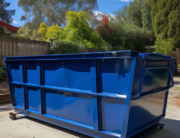The Environmental Benefits of Skip Bins
A Greener Way to Dispose of All Waste Types
Do you feel guilty every time you throw something in the garbage?
Most people want to help the environment but aren’t sure how to properly dispose of junk in an eco-friendly way.
Skip bin hire companies will explain how using skip bins can drastically reduce your environmental effects.
Regular Garbage Harms the Planet
When we toss stuff in the normal trash, they end up in landfills that take up space and release methane gases that warm the planet. Many things like electronics, batteries, and lightbulbs contain toxic stuff that can leak out and contaminate soil and groundwater. Recyclable materials like paper, glass, and metals and even food scraps get lost in the junk stream instead of being reused.
Throwing things away is extremely harmful to the environment. But what’s the solution for the average person trying rubbish removal responsibly?
Skip Bins Keep More Garbage Out of Landfills
Skip bin services provide large dumpsters that you can fill up with garbage. The key importance is that the junk gets diverted from landfills and sent to proper disposal and recycling efforts at facilities instead. Junk disposal solution keeps valuable materials in circulation and prevents hazardous chemicals from polluting ecosystems.
Here are some of the main ways skip bins help the environment:
1. More Materials Get Recycled
Skip bins make it easy to recycle paper, cardboard, glass, aluminum, and other standard recyclable materials. Recycling reduces the need for virgin materials extraction, energy saving, decreases pollution, and stops junk accumulation in landfills and other natural resources. Most skip bin hire service providers sort through the junk and ensure recyclables reach the proper recycling centers.
2. Hazardous Material Gets Safely Contained
Many hazardous household stuff like batteries, CFL bulbs, paint cans, pesticides, and old electronics can’t legally go to regular landfills. Skip bin experts are equipped to properly dispose of these dangerous materials so they don’t poison the environment.
3. Less Landfill Accumulation
Modern landfills have protections in place to contain junk and prevent pollution, but it’s still better to reduce what gets sent there in the first place. Using a skip bin means more of your junk gets recycled or safely incinerated rather than sitting in a landfill forever.
4. Lower Carbon Emissions
Landfills release methane, a potent greenhouse gas, as materials slowly break down underground. Recycling and proper waste disposal reduces landfill emissions. Also, recycling decreases the energy needed to manufacture new products from scratch. All of this helps lower a carbon footprint.
How Does Skip Bin Recycling Actually Work?
So how do skip bin experts ensure your garbage gets recycled and disposed of properly? Here’s a look at the general recycling process:
- You fill up the skip bin with a mixture of materials like paper, plastic, glass, and more.
- Workers pick up the loaded bin and take it to a material recovery facility (MRF).
- At the MRF, the waste goes through a series of screens, magnets, and optical sorters to separate out each building waste material type.
- The separated recyclables like metal, paper, and plastic get compressed and sent to various facilities to be turned into new products.
- Hazardous materials get sent to specialty waste management. Organics get composted. What’s left goes to a waste-to-energy generator or landfill.
- Almost nothing that goes into a skip bin actually ends up sitting unused in a landfill.
So you can rest assured the waste you put in a skip bin gets handled sustainably.
Best Materials to Put in Skip Bins
What exactly should you put in a skip bin to maximise recycling? Here are some ideal materials:
- Paper and cardboard – Just make sure to remove any plastic or foam first.
- Plastics numbered 1-7 – Skip bins can handle all standard plastic types.
- Glass bottles and jars – Remove lids first when possible.
- Aluminum cans, foil, and scrap metal
- Appliances and electronics – Many companies now recycle these.
- Green garden waste like branches, leaves, and grass clippings for composting
- Scrap wood, lumber, and pallets
- Clothing, furniture, mattresses
- Tires, batteries, motor oil, and other hazardous auto shop waste
Skip bins can take almost any type of residential or commercial waste as long as it’s not hot ashes, liquids, or chemicals that require special disposal. When in doubt, ask your skip bin provider.
Skip Bins Are More Sustainable Than Dumpster Rentals
Many people considering proper waste management services wonder what the difference is between using a skip bin vs. renting a dumpster. Here are some key advantages of skip bins:
- More recycling – Dumpsters often end up with waste headed straight to the landfill. But skip bin companies actually sort and recycle materials after pickup.
- Proper hazardous waste disposal – Dumpsters don’t separate out hazardous things like batteries, light bulbs, and electronics. Skip bins ensure these get safety handled.
- Lower carbon footprint – With more recycling and less landfilling, skip bins have a lower environmental effects such as with green waste.
- Local companies – Skip bin providers tend to be smaller local businesses. Dumpster rental often involves large national corporations.
- Better for large projects – Skip bins come in larger sizes (up to 30 cubic meters) and can handle bigger jobs.
So if you want to dispose of waste in the most eco-friendly way, skip bins are the optimal choice over dumpster rentals.
Top Tips For Using Skip Bins Sustainably
Follow these tips when using skip bins to maximize environmental benefits:
- Separate materials – Keep different material types like wood, metal, and glass in their own areas in the bin when possible to make sorting easier.
- Break down large items – Dismantle furniture, pallets, and other big objects so the pieces can be recycled.
- Clean out containers – Make sure bottles, cans, and other containers are empty and clean before recycling.
- Check with company first – Ask your provider what materials they accept and how to properly prepare them.
- Fill bin fully – Make sure to completely fill the bin to capacity to reduce the number of hauls needed. But don’t overfill.
- Schedule pickup promptly – Don’t let bins sit too long before being emptied to avoid issues like spills or pests getting in.
- Educate others – Explain proper sorting and recycling practices to others using the skip bin like workers or family.
Following sustainable skip bin practices takes a small amount of extra effort, but pays off by significantly reducing your environmental footprint.
Frequently Asked Questions About Skip Bins
What size skip bin should I get?
Choose a bin size based on the estimated volume of waste. A 6m3 bin fits approx. 3-5 rooms of house contents or waste from a small renovation. Larger projects may need 10m3, 15m3, or even 30m3 skip bins.
How much waste can a skip bin hold?
An average 3m3 skip bin holds 1,000-1,500 kg in weight. Bigger 10m3-30m3 bins hold 3,000-9,000 kg. Get the biggest size your project requires so you don’t need multiple bins.
What can’t go in a skip bin?
Avoid hot ashes, liquids, oils, paints, chemicals, and any hazardous materials banned from landfills. Check with your provider about prohibited stuff. Also, don’t overload bins past the top.
Do I have to sort materials into skips?
It’s ideal to separate different material types, but single stream skip bins don’t require strict sorting. The recycling sites will sort everything after pickup. Still, basic sorting makes their job easier.
How much do skip bins cost?
Pricing depends on bin size, drop off and pickup fees, weight limits, and rental duration. A typical 2-4 day rental of a small 3-4m3 skip often costs $300-$500. Larger bins for big projects cost more.
Can I extend my skip bin rental?
Yes, most companies allow you to extend your rental if you need the bin longer, up to 2 weeks typically. There is usually a small daily rental extension fee. Just inform the company before your initial rental end date.
Conclusion
Skip bins are a simple and sustainable waste management practice that benefits the planet in numerous ways.
So next time you have a home cleanup or renovation project, be sure to get a skip bin delivered.
You’ll feel good knowing your waste will get handled responsibly.
When people work together to properly sort and recycle waste, we can keep millions of tons of valuable materials out of landfills each year.
Using skip bins is one small change that adds up to make a huge global environmental impact.




